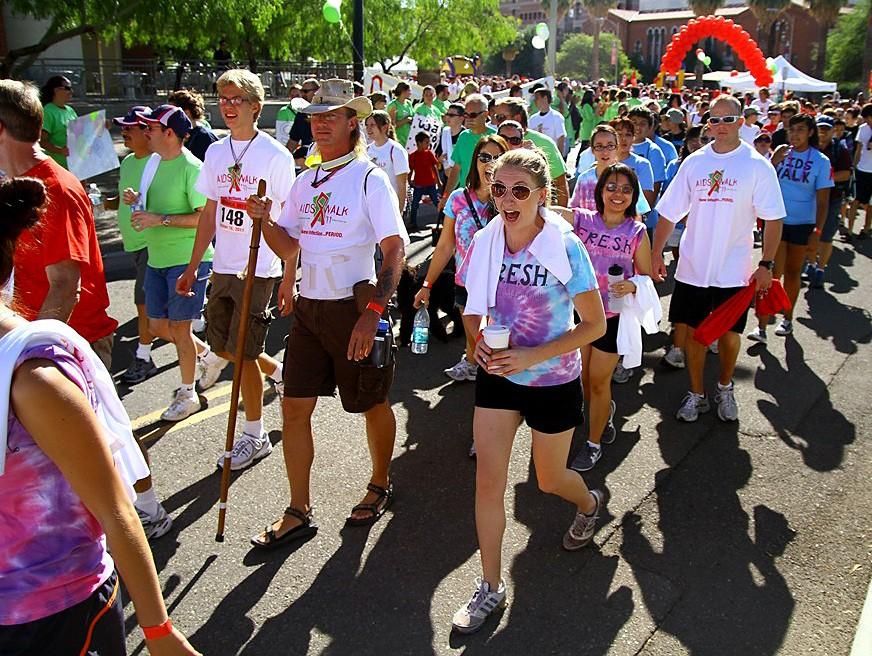The AIDS Walk Tucson, benefiting the Southern Arizona AIDS Foundation, completed its 23rd annual walk on Sunday on the UA Mall.
The Mall was scattered with tents from various organizations such as Devereux Arizona Proud Families, a program specializing in the recruitment and training of lesbian, gay, bisexual and transgender families for adoption and foster care, and the Pima County Health Department, which provided free HIV testing.
Jeffrey Scott Brown, a 47-year-old Tucson resident and creator of AIDS Ribbon Tucson, staked the ribbon on the Mall as an active memorial to those who have died from HIV or AIDS. The first incarnation of the ribbon was carried out by those living with HIV as the last entry of the 2008 pride parade, Brown said.
“We’ve respectfully asked every year to be the final entry as a solemn reminder of all those people that we’ve lost, and a reminder to the folks watching to please remain vigilant, stay safe, play safely, educate yourself and those around you that you care about and remember those who went before us,” Brown said.
Brown created the ribbon after losing several of his friends to HIV, and stressed the importance memorializing those who have died as way to maintain awareness.
“If we forget we’re lost, (and) we will all lose, and we’ve got to stick with it,” he added.
Tucson AIDS Quilt, a community art project, memorializes members of the Tucson community who died of AIDS. The inspiration for sewing quilts as a memorial came from the 1983 protest in San Francisco when the AIDS epidemic first broke out, according to Greg Rogan, a volunteer for the foundation and owner of The Medicine Shoppe, a community pharmacy.
Protesters marched into the San Francisco Federal Building and posted large sheets of cardboard on the walls that listed the names of people who have died from HIV. The series of posters resembled a quilt, which led the idea of sewing quilts as a form of remembering those who have died from HIV.
Serjio Santa Cruz, a volunteer for the AIDS Foundation, read the names of those who have passed during the quilt ceremony.
“My reason for doing this is because I am HIV positive … ever since I found out about my diagnosis is when I started getting more active and more involved, not only in the gay community but in the hetero community as well,” he said. “The more education we get on it, the more knowledgeable we become on prevention.”
Mathias Pollock, a UA graduate and returning Peace Corps volunteer, worked with an HIV/AIDS organization in Ecuador. Pollock, who is from Washington, D.C., said that the state has a high population of people infected with AIDS, and that several of his friends are struggling with the disease.
“Coming back to the United States, I wanted to keep supporting the cause,” Pollock said.
Volunteers also included UA students, such as members from Alpha Phi Omega, the UA’s community service fraternity.
Eric Allee, a microbiology junior and member of the fraternity, said the event was a good way to give back to the community and raise awareness in a positive atmosphere.
Debbie Doehnert, a fourth-year pharmacy student, said she has been running in the AIDS Walk for five years and that participating in events that fight against AIDS is important, especially because of the high prevalence of AIDS in Tucson.









